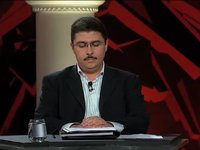This House believes President Assad must resign
Sunday November 27 2011
MOTION PASSED
by 91% to 9%
Transcript
Order of speeches

Introduction
TIM SEBASTIAN
Ladies and gentlemen a very good evening to you and welcome to the latest in our series of Doha Debates, coming to you from the Gulf state of Qatar and sponsored by the Qatar Foundation. Out of all the Arab states to be hit by the pro-democracy wave this year, Syria is putting up the stiffest resistance. President Assad's forces are said to have killed well over 3,500 people protesting at his rule and the number is rising by the day. He promises political reforms but somehow they don't appear; he promises the Arab League to remove tanks from the streets but they're still there, to let in foreign observers but they're still excluded. So should he step down or is the President still a vital player in a turbulent and dangerous region. Our motion tonight takes the opposite view: This House believes that Syria's President Assad should resign. Our panel of course represents both views. Speaking for the motion, Obeida Nahas, a Syrian politician who's a member of the Syrian National Council and the National Action Group for Syria. And with him, Emile Hokayem, Senior Fellow for Regional Security at the International Institute for Strategic Studies in Bahrain. Against the motion, Ammar Waqqaf, he's a management consultant and member of the Syrian Social Club, a pro-government group supporting reform based in London, and Kamel Wazne, political analyst and founder of the Centre of American Strategic Studies, a regional think-tank based in Beirut. Ladies and gentleman, that's our panel. So now let me first ask Obeida Nahas to speak for the motion.
Obeida Nahas
Speaking for the motion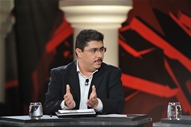
OBEIDA NAHAS
Thank you, Tim. For 11 years we had to put up with a president whose only qualification was that he was the son of a dictator who crushed our society, liberty and rights for 30 years. Many Syrians believe that the international community was implicit in the smooth power transition back in 2000, or let me put it this way, the pass over of a republic from a father to his son. But many others believe that it was our responsibility to regain our rights. Modernity, economic development, stability, etc, were all used along the way to justify the Shah's rule. But after another lost decade on all these fronts, the Syrian people who got nothing in return for their silence but more detentions, torture and killings, took the lead and revolted against one of the worst tyrannies in the region. They exposed a once-called Western educated doctor for what he is, a butcher willing to do anything to remain in power. When a ruler faces protests as wide and painful as the Syrian revolution, this is a cry for help. Have you asked yourselves why people are willing to go out and protest every day and die in front of tanks and refuse to go back home before their demands are met? What kind of life do they lead under such a regime? Five thousand heroes fell over the last eight months, 40,000 were wounded, 35,000 were detained. How many more of us should Bashar al-Assad kill before he goes? If you think he can still stay after all this, then try to convince the mothers of 300 killed children by his Shabihah troops.
TIM SEBASTIAN
Can you come to a close?
OBEIDA NAHAS
Yes, and let's not forget, including the weeping mother of the latest ten-year-old victim in Bayada, Homs yesterday, Sari Saoud. No throne in the world is worth the life of one civilian. I think Bashar al-Assad must resign immediately.
TIM SEBASTIAN
Obeida Nahas, thank you very much indeed. You say Syrians took the lead and revolted. How many Syrians? One percent of the population perhaps, tiny, tiny percentage there, 150,000 people maybe in all. What about the others, don't they have a say, the majority?
OBEIDA NAHAS
Of course they have a say.
TIM SEBASTIAN
He still has strong support in the country?
OBEIDA NAHAS
Well, they don't have the means to have their say, that's the problem. If this regime...
TIM SEBASTIAN
But they are having their say. They're turning out in demonstrations pretty frequently to support him.
OBEIDA NAHAS
Well, we believe these demonstrations are not true. They are forced to go out. They have to go out from their schools...
TIM SEBASTIAN
They can't all be forced to go out. I mean even the American Council on Foreign Relations says he still commands a strong and loyal army, enjoys support from the business elite in Syria's two largest cities in Damascus and Aleppo, also retains the support of many, especially the minorities who fear what will happen if he goes. That's quite a lot of support in the country.
OBEIDA NAHAS
No, it's not.
TIM SEBASTIAN
And you're calling daily for his overthrow?
OBEIDA NAHAS
No, it's not. If he's so confident, why doesn't he open up and have free elections? It's very easy. He can open up and have free elections, he can actually accept observers to come in, accept the free media to go in. Why isn't he not doing so? He's hiding something.
TIM SEBASTIAN
Do you think seriously the day Assad steps down, which is what you're recommending, that some kinder, gentler figure is going to emerge from the wings, who's going to respect human rights suddenly, who's going to give the people all they've been looking for, the freedom? Do you really think that's in the wings? Doesn't look like it, does it?
OBEIDA NAHAS
This is the end of Superman hero figures.
TIM SEBASTIAN
Yes, but if you get something worse than Superman, what if you get something worse than Superman?
OBEIDA NAHAS
No, anything will be better than this president.
TIM SEBASTIAN
Why should anything? It could be worse.
OBEIDA NAHAS
No, it's not. I'm sure he...
TIM SEBASTIAN
How do you know? How do you know?
OBEIDA NAHAS
Because so far, for eight months he's been pushing people into the direction of civil war and they have refused to...
TIM SEBASTIAN
We're already seeing the Free Syrian Army posting forced confessions on the internet from captured security officers. Are these the kind of people you want to take Assad's place?
OBEIDA NAHAS
No, the Free Syrian Army are people who defected from his army and they had to obey... they disobeyed the orders.
TIM SEBASTIAN
This sectarian retribution, that's what we're seeing already, according to international observers. That's what you want, that's the future?
OBEIDA NAHAS
We never experienced sectarianism in Syria before Assad, so Syrian society has always been united, it has always been open. We don't have a problem with Bashar because of his background or because of his ideology. We have a problem because of his actions.
TIM SEBASTIAN
Okay, Obeida Nahas, thank you very much indeed. Now let me ask Ammar Waqqaf to speak against the motion please.
Ammar Waqqaf
AMMAR WAQQAF
Good evening to you all. I'm going to start by a piece of news that maybe is shocking to some of you: President Bashar al-Assad still enjoys the support of the majority of Syrians. I like to call them the tacit majority, the majority from whom or about whom we hear very little. If anyone is interested in the proof, the proof is already there, it's not very hard to find. The president is still in office, his government, unlike what happened in many places in the region, is still intact, its institutions are still functioning effectively, whether civil or military. In other words, I believe that had the Syrian people really wanted President Assad out of the office, he will have gone by now, a long time ago. Now to elaborate more about this notion of tacit majority, it does not only consist of die-hard supporters of President Assad and his policies; it also consists of people who are not particularly affiliated with any political program or do not have a political preference at all. It may also consist of people who actually oppose President Assad on this or that subject, or perhaps don't like him for all subjective reasons of some sort. But they do not like what is being offered to them and that makes them de facto supporters of President Assad. Now, this tacit majority, who I have the honour to represent this evening, do not want President Assad to resign. Reasons can be summarised in three, among any others really, but I'm going to focus on three this evening. (A) this tacit majority does not feel secure about Syria or the future of Syria without him being around. (B) the majority of Syrians are not very sure about the agenda that is being put on the table, are we serving interests of an international and regional nature or are we serving the Syrian and national domestic interests. And third, speaking about reform, we need a strong government that is independent of regional influence in order to have a sustainable reform. We just do not want any change; we want a sustainable reform that can go for years and years to come. That's all I have to say.
TIM SEBASTIAN
Ammar Waqqaf, thank you very much indeed. If they wanted him to go, he would have gone by now. You seem to pay no attention to the massive catalogue of human rights abuses that these Syrians have suffered over the years, a security network that has violated their civil and political rights, arrested political and human rights activists left, right and centre. Do you think they're in a condition to speak their mind freely, apart from the brave few who go on the streets?
AMMAR WAQQAF
What do you think, Syrians conduct their business any different from any other region, you know, country, in the region? It's all the same here. We conduct our business somehow that is not very democratic, but that is...
TIM SEBASTIAN
Violating, as Human Rights Watch's report for last year said the civil and political rights, security agencies detaining people without arrest warrants, without giving information where they are.
AMMAR WAQQAF
Having lived in England for about seven years, I do know that it's not very shiny out there, but, you know, defragmenting...
TIM SEBASTIAN
It's a little more than not very shiny out there.
AMMAR WAQQAF
Well, I'm going to give you a [overtalking] on that one...
TIM SEBASTIAN
If you call a massive human rights violation not very shiny, it's a little bit more than that, isn't it?
AMMAR WAQQAF
Well, it is an understatement, isn't it?
TIM SEBASTIAN
Are you denying that torture takes place on a regular basis?
AMMAR WAQQAF
No, no, not at all, not at all. I mean I know people who work...
TIM SEBASTIAN
And you still think this is the best man for the job?
AMMAR WAQQAF
Well, is it about the man or is it about the regime, the system?
TIM SEBASTIAN
Well, our motion is certainly about the man: This House believes President Assad must resign, or maybe you want to go over to that side of the argument, do you?
AMMAR WAQQAF
No, no, not at all, but I do believe that the regime is about hundreds of thousands of employees who have conducted their business in a certain way for over a decade, and changing that is not about changing the person who sits on top of that regime, is it?
TIM SEBASTIAN
It's getting rid of some, well, the buck stops with him, doesn't it?
AMMAR WAQQAF
No, it doesn't.
TIM SEBASTIAN
Why not, why not?
AMMAR WAQQAF
It will make it worse.
TIM SEBASTIAN
He's the man, he's the president. You're saying he's not in charge?
AMMAR WAQQAF
Yes, he is in charge and he is the president.
TIM SEBASTIAN
And he doesn't have responsibility for what goes on?
AMMAR WAQQAF
He's the most capable person of changing that regime.
TIM SEBASTIAN
And what his army and his security services are doing. He's shown no desire to change anything. He promised change from the day he came into office.
AMMAR WAQQAF
It's not his army and his security forces. It's Syria's army and Syria's security forces.
TIM SEBASTIAN
Oh, and he's not the Syrian President?
AMMAR WAQQAF
He is and the constitution, he commands the loyalty of the army.
TIM SEBASTIAN
So how come you're opening up a gap between him and the security? So are you saying he's not in charge?
AMMAR WAQQAF
He has a constitutional privilege of commanding those people; he's the Supreme Commander, that's constitutional. It's not about his army, it's Syria's army which he commands.
TIM SEBASTIAN
All right Ammar Waqqaf, thank you very much indeed.
AMMAR WAQQAF
Thank you very much.
TIM SEBASTIAN
Now could I ask please Emile Hokayem to speak for the motion?
Emile Hokayem
EMILE HOKAYEM
Thank you. It's high time for President Bashar al-Assad to resign. His views and softer image have fooled many of us for too long. We were told that he was a reformist at heart, that he faces opposition from within the system, that he cared about regional peace and stability. We can't look into Mr Assad's eyes and evaluate his intentions, but what we can do is judge his policies and outcomes for which he should be held accountable. The Syrian people are doing just that after 41 years of Assad's rule and they're giving him a failing grade. But the crisis has also a regional dimension. He and his supporters' latest, most desperate defence is that Syria is the beating heart of Arabism and therefore deserves special treatment. The problem with this argument, unless anyone has forgotten, is that the millions of Arabs who took the streets this year have redefined Arabism to give it real substantive meaning - democracy, dignity, economic justice and opportunity. Assad's style of Arabism is loathed throughout the region, not admired. Arabs reject Assad's narrative and he has no remaining appeal. Don't take it from me. Every poll shows his popularity in the Arab world to have shrunken to a minimum. The latest Brookings Poll shows that 86 percent of Arabs support the Syrian uprising. The Zogby poll agrees with this finding and it indicates that the overwhelming majority of Arabs think this is a popular revolt, not a foreign conspiracy, as Assad asserts. More than 90 percent of Arabs think that he can no longer govern the country; in essence, they agree with our side of the motion. Four decades of empty, bombastic, Assad-style Arabism have not helped Syria recovered the Golan Heights or advanced the Palestinian cause or stabilised Lebanon. To the contrary. And all this has cost the Syrian people dearly -oppression, political underdevelopment, isolation and, most recently, sectarianism. Certainly without Assad and his system, Syria can again become a beacon of prosperity, culture and tolerance for its great and courageous people.
TIM SEBASTIAN
Emile Hokayem, thank you very much indeed. It could become a beacon for that or it could become another Iraq, couldn't it? You simply don't know.
EMILE HOKAYEM
All possibilities are open but what is...
TIM SEBASTIAN
But there's nothing whatever to suggest even the remotest chance of a peaceful handover, is there?
EMILE HOKAYEM
So far everyone is amazed at how resilient and peaceful the Syrian protesters have been. They've been under attack for eight months; we've seen sectarian retribution only in the past few months.
TIM SEBASTIAN
And they've been fighting back and, as I said earlier, posting forced confessions...
EMILE HOKAYEM
Self-defence.
TIM SEBASTIAN
... from security men that they captured.
EMILE HOKAYEM
Self-defence. We don't have... we have only...
TIM SEBASTIAN
Self-defence? Forced confessions are self-defence? I don't think so. I've never seen self-defence that resulted in a forced confession before.
EMILE HOKAYEM
Well, there are extreme elements in the opposition. No one will...
TIM SEBASTIAN
It's torture, it's torture, the same, the same thing that the human rights organisations accuse Assad of.
EMILE HOKAYEM
This is, this is the problem, it's 40 years of brutality. I'm sure there are some in the...
TIM SEBASTIAN
Okay, so all you're advocating then is to exchange one brutality with another?
EMILE HOKAYEM
Not at all.
TIM SEBASTIAN
Which may be even worse.
EMILE HOKAYEM
The Syrian opposition is a lot more diverse and a lot more tolerant and a lot more peaceful than the Assad regime is. We've seen this very hard...
TIM SEBASTIAN
But the early signs, the early signs are not good, are they?
EMILE HOKAYEM
The early signs, they've been under relentless attacks by the regime for eight months.
TIM SEBASTIAN
They can't agree.
EMILE HOKAYEM
They've been under relentless attacks by the regime for eight months and we have seen them in most of the regions stay peaceful, utterly peaceful, and actually interact more and more with people.
TIM SEBASTIAN
It's a mistake to call them one group, isn't it?
EMILE HOKAYEM
No.
TIM SEBASTIAN
Because they are deeply divided on major issues, the various opposition groups.
EMILE HOKAYEM
They are asking for the same thing, which is the downfall of that regime.
TIM SEBASTIAN
Yes, but they wanted it in very different ways.
EMILE HOKAYEM
Certainly, but for the moment the leadership of the opposition and most Syrian activists stand by their ground: they want a peaceful revolution.
TIM SEBASTIAN
And you don't think they'd settle scores in the Alawite villages in Syrian, because most Western observers feel that they would, at a minimum; that is the kind of retribution that they would seek.
EMILE HOKAYEM
For the moment it's the regime that's enflaming sectarian passions and actually endangering their Alawite community for the moment, for the day the transition happens. It's not about the opposition going into those regions and causing deaths and violence.
TIM SEBASTIAN
All right, Emile Hokayem, thank you very much indeed.
EMILE HOKAYEM
Thank you.
TIM SEBASTIAN
Now please could I ask Kamel Wazne to speak against the motion?
Kamel Wazne
KAMEL WAZNE
Good evening. No one can deny that reform is needed in Syria, as it's needed in most of the Arab world. The current crisis highlights the impasse we are facing. What is needed? Political reform, political change, democracy, more freedom? Yes to all, but at what cost and to what extent are we pushing the country into the unknown? Today the Arabs voted for sanction, economic sanction against Syria. It's a sad day. What's happening is too fast, too quick to pull the trigger. What do we want in Syria? Sectarian war, rise to Islamic extremism? I have heard of many killings are based on religious beliefs, killing, assassination. A few days ago seven of the Air Force were killed in an ambush. What for, what was their crime? Just because they were Syrian soldiers? Today the Middle East is facing the American withdrawal of Iraq from Iraq; some would say America lost Iraq, America got defeated in Iraq and some US policymakers wondering if Syria becoming the locus of a new regional proxy war between Syrian allies, Iran and the other camp, Saudi Arabia and the Persian Gulf countries with the backing of the US. Yes, that is true. They need to keep Iran in check and contained, that's what they're trying. Syria today needs help, needs reconciliation not sanctions. We don't want to sanction the people, the poor people of Syria. Sanctions never helped any people; sanction, economic sanction is a war crime in my estimate. No sectarian war, no country should smuggle weapons into Syria so they can have sectarian war.
TIM SEBASTIAN
Could you wrap up, please?
KAMEL WAZNE
The Arabs gave the Israeli initiative time since 2002 and nothing happened. Why the rush today on Syria? For that I am not for the motion that Assad at this time should resign. We need time and we need patience.
TIM SEBASTIAN
All right, Kamel Wazne, thank you very much. There may be no rush for you, but you're talking about a people who with Assad's father, first of all, had between 10,000 and 40,000 people murdered by his security forces. Now his son, Bashar al-Assad, who's killed, according to the United Nations, more than 3,500 people, and you say there's no hurry. Easy for you to say; the people might think very differently about that. Aren't they fed up with the killings?
KAMEL WAZNE
Well, obviously killing is not a good thing for any system around the world...
TIM SEBASTIAN
What do you mean, not a good thing? It's not a parking offence, you know.
KAMEL WAZNE
It is... what I'm saying...
TIM SEBASTIAN
I mean it doesn't get much worse than that, does it?
KAMEL WAZNE
Yes, yes, it's very true.
TIM SEBASTIAN
When you murder your own people.
KAMEL WAZNE
We, we... the killings, the killing...
TIM SEBASTIAN
How much worse can it get?
KAMEL WAZNE
The killing is on both sides. The number that says 3,500, there is killing, but not that number. There are about 800 people killed from the...
TIM SEBASTIAN
How do you know? Because that's the regime's version.
KAMEL WAZNE
Well, that's the regime...
TIM SEBASTIAN
That's the regime version.
KAMEL WAZNE
Yes, it is the regime's version and the other numbers saying also there is...
TIM SEBASTIAN
Why should they be believed?
KAMEL WAZNE
... soldier been killed by the, what they call, the opposition...
TIM SEBASTIAN
Why should, why should, why should they believed? They've promised... Everything that they've promised has turned to dust, hasn't it? The promises that Assad made to the Arab League, one by one have been shown to be false promises. He didn't deliver on any of them, did they?
KAMEL WAZNE
The issue that I'm really worried about, I'm not talking about...
TIM SEBASTIAN
But why trust these figures?
KAMEL WAZNE
I'm not talking about, I worry, I worry about is we see a sectarian war, a war that's taking place like what happened in Iraq.
TIM SEBASTIAN
But you're still saying this man is the best man for his job.
KAMEL WAZNE
We lost a million persons in Iraq. I'm afraid that the situation in Syria could be like Iraq and this will spill into Lebanon and other areas. You will have...
TIM SEBASTIAN
So keep a guy because..
KAMEL WAZNE
No, we wanted...
TIM SEBASTIAN
Keep a guy who abuses human rights and has done since he came in.
KAMEL WAZNE
We wanted a dialogue, we wanted [overtalking], we cannot allow things to rush. Yes, there is a problem but that problem cannot be addressed by smuggling more weapons, by killing, by continuing killing and by saying...
TIM SEBASTIAN
It depends who's doing the killing, doesn't it?
KAMEL WAZNE
... don't drop your weapon, continue shooting at the civilians.
TIM SEBASTIAN
Depends who's doing the killing.
KAMEL WAZNE
Well, both sides, there's killing on both sides.
TIM SEBASTIAN
Yes, different scale.
KAMEL WAZNE
And I'm saying we need really...
TIM SEBASTIAN
Different scale from the government [overtalking], 3,500 people.
KAMEL WAZNE
We don't, we don't want more [overtalking]. Yes, I'm saying we need more time to reconcile the differences, let's stop the killing and start the healing. That's what we're looking for.
TIM SEBASTIAN
Kamel Wazne, no sign that anybody's going to reconcile any differences from the government. Thank you very much indeed. All right, ladies and gentlemen, we are going to take your questions now on the motion that This House believes President Assad must resign. The lady in the second row, I think you had your hand up first. If you'd get up and tell us where you're from, please.
Audience questions
AUDIENCE (F) 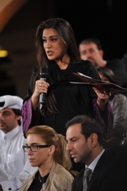
I'm from Qatar. I have a question for Mr. Ammar Waqqaf. You said in a statement earlier that America and the West has interest in destabilising the region and that's why they want Bashar al-Assad out. But you know as much as anybody else that if America wanted him out, they could have gotten him out. He's weaker than Saddam was when they took him on, so why do you think that? Like this is not really a conspiracy.
AMMAR WAQQAF
Right, can I answer that?
TIM SEBASTIAN
Yes, please.
AMMAR WAQQAF
Okay, please have a seat. First of all, it's not about the president or not, it's about Syria's position in the region and how much that is in line with America's interests in the region. Now, with regards to the current tug of war that is happening between the West, America, Britain and so forth and the East, Russia, China, India and so forth, it is about spheres of influence. And there is a sort of an amicable Yalta conference that is taking place at the moment in which Russia and China said, no, Syria is not going to become within the sphere of influence of America. Now if you really think that America can easily, just like that, get rid of any president, it would have to be a president that they appointed themselves, not the case unfortunately with President Assad.
AUDIENCE (F)
But even if America had interests, how is Bashar al-Assad by killing people, by killing children, by killing women, how is he proving that he's the best person? So how does that change the fact that he's a dictator killing people of his own country?
AMMAR WAQQAF
As a Syrian citizen, I do not have a problem with America having interests that align with my interests.
TIM SEBASTIAN
She wasn't asking that. She was asking about how you can accept Bashar al-Assad killing people.
AMMAR WAQQAF
Just a second, America themselves have killed a lot more people than Bashar al-Assad has.
TIM SEBASTIAN
We're not talking about America. We're talking about Syria at the moment.
AUDIENCE (F)
Well, I mean, it is the [overtalking].
TIM SEBASTIAN
Not whether Americans accept...
AMMAR WAQQAF
Is President Bashar al-Assad killing people really? Do you think he wakes up every morning, says I'm going to kill like 20 people today?
AUDIENCE (F)
So you think...?
TIM SEBASTIAN
I don't know that any American President has killed as many of his own people. I don't see them being shot down in New York or Washington.
AMMAR WAQQAF
Well, they don't have to. They're killing everybody else, aren't they? Like ten times the number or 20 times, and look what's happened in Libya.
TIM SEBASTIAN
You can divert it to talk about anything you like but you haven't answered her question yet.
OBEIDA NAHAS
So if the Americans kill Japanese or Iraqis, then Bashar has to kill Syrians. I don't understand this argument.
AMMAR WAQQAF
Okay, it's about...
OBEIDA NAHAS
There has to be some logic in it.
AMMAR WAQQAF
It's about interests of America in the region. We align with interests of America in the region when we like, when we have to, when it is in our interest. We do not get, we do not obey America.
OBEIDA NAHAS
But you're degrading the whole thing to numbers. I mean even Kamel was talking about numbers. These people are not numbers, these people are aspirations for their families, these people are future projects. We have 5,000 devastated families and we have tens of people who we don't know...
AMMAR WAQQAF
Do you know that one-third of those devastated families come from the army and the security forces? What about them? Why don't everybody, why doesn't anybody speak about them - as if they were not there? And these people were killed from day one in the ambush in Banias. And the ambush in Banias was not provoked at all. It was an army personnel bus carrying people home after the, you know, official working hours and they were attacked in Banias by people who were affiliated to northern Lebanese groups. It happened on day one.
TIM SEBASTIAN
All right, look I'm going to take a question from the lady in the third row there. Yes, you. Would you stand up and tell us where you're from please?
AUDIENCE (F)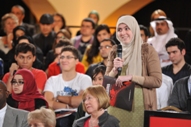
I'm from Hama and my question is to Mr. Ammar. You talked about the majority being in support of President Bashar al-Assad. Then why do you feel he needs to take such a drastic measure to stay in power?
AMMAR WAQQAF
What drastic measure?
AUDIENCE (F)
Killings, murders...
AMMAR WAQQAF
You know, madam, I'm afraid you don't understand what's going on. People are getting killed and the army is not killing peaceful demonstrators; they are shooting back at people who are shooting at them. We have one-third of the casualty...
TIM SEBASTIAN
But that's not, that's not the UN version, is it?
AMMAR WAQQAF
Well, I've seen funerals of so many people.
TIM SEBASTIAN
That's not the version of any observers.
AMMAR WAQQAF
Oh, have you seen...?
OBEIDA NAHAS
Oh, how many funerals of army personnel?
TIM SEBASTIAN
122 votes in the General Assembly calling for an end to the violence by the Syrian Government, 122 votes.
AMMAR WAQQAF
Do you know what the problem or, you know, stumbling block behind any Security Council resolution? It was because the West never wanted to agree that they were counter-violence rather than violence.
TIM SEBASTIAN
Oh, so this is political?
AMMAR WAQQAF
No, it's not political. It's just about people are getting killed...
TIM SEBASTIAN
Even you said, even you said, I think the phrase was, "it's not that shiny over there".
AMMAR WAQQAF
No.
TIM SEBASTIAN
There's a lot of people being killed in a not very shiny way, I think, over there isn't it?
AMMAR WAQQAF
No, it's not, it's not shiny at all, but we are at war with some people who are backed from the outside, who are promoted from the outside.
TIM SEBASTIAN
Let's let the questioner come back please?
AUDIENCE (F)
So is this the same... is this the same way that Hafez al-Assad killed 10,000 to 40,000 people in Hama? Were they all armed and firing back? Wouldn't you say he was in this sense defending his position and wanting to stay in power, the same way his son now is doing the same thing in Homs, in Hama, in Dera? What's your response to that?
AMMAR WAQQAF
First of all, I do appreciate that you are from Hama. But unfortunately for you, President Assad didn't kill 10,000 people in Hama. I disagree with the number in itself. But he didn't kill them just out of the...
AUDIENCE (F)
Why? I have a book, I have a book here with the...
AMMAR WAQQAF
I disagree with the number. There are no official accounts obviously but I know that people were killed in Hama...
AUDIENCE (F)
The Syrian Human Rights Committee is not official?
AMMAR WAQQAF
And Hama was destroyed
AUDIENCE (F)
Yes.
AMMAR WAQQAF
But did that happen out of the blue? Do you think people in Hama were killing other people? Do you think that was about stopping the civil war that should have killed ten times more Syrians?
AUDIENCE (F)
It was some, it was [inaudible] brotherhood killed a few people and that gives him the right to go into a whole city and destroy it?
AMMAR WAQQAF
You know, madam, that civil war that was planned could have killed 100 more, 100 times more Syrians, you know. What are we talking about here?
AUDIENCE (F)
What planned civil war?
AMMAR WAQQAF
What?
AUDIENCE (F)
What planned civil war?
AMMAR WAQQAF
The civil war that was planned to Syria to happen just like what happened in Lebanon. You know, it's about sectarian elimination.
TIM SEBASTIAN
Okay, I'm going to bring Emile Hokayem in here.
AMMAR WAQQAF
Does everybody not understand that?
TIM SEBASTIAN
Emile Hokayem?
EMILE HOKAYEM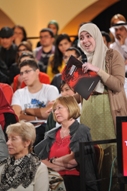
It's a bit disingenuous first to blame all this on a grand Western conspiracy. I mean, if we remember well, Secretary Clinton and Senator John Carey were talking about Bashar al-Assad as a reformist in March, April, May and later. And actually the US was late to come to realise how bad the situation was and that it needed to shift its position. The second thing is that back in '82 it took several weeks, if not months, for us to realise what was happening in Hama. Today it's streaming live. We have actually videos, we have testimonies coming to us every day that show the extent of the brutality. In fact, there is also Syrian soldiers serving in the army that is loyal to Bashar al-Assad who take pictures of them torturing others and selling them and broadcasting their brutality in an effort to terrorise the population.
TIM SEBASTIAN
But the brutality is not on one side, is it? I mean there have already been Western reports saying it's...
EMILE HOKAYEM
For several months it was only on one side; no one is going to deny that the opposition has... within the opposition there are radical elements that are using also condemnable violence. But it is not, you cannot compare the scale...
TIM SEBASTIAN
And you condemn them too?
EMILE HOKAYEM
It is, of course...
TIM SEBASTIAN
These people who you want to take over from Assad...?
EMILE HOKAYEM
Of course, no one has got, no one is going to, no one is going to condone such brutality but it's still localised, the scale doesn't compare. Most of the violence is regime instigated and I apologise.
TIM SEBASTIAN
Okay, all right.
EMILE HOKAYEM
The sectarian element was introduced by the regime.
TIM SEBASTIAN
I'm going to let Kamel Wazne come in on this.
KAMEL WAZNE
Look, we here not to prosecute what happened in ‘82. We here, we're looking at what's happening right now and we're looking at the map of the Middle East, what will emerge after what has taken place in Syria. What has taken place in Syria is really not about Syria. What has taken place in Syria, it's a new map that's been drawing for the Middle East. We know the Americans, even the Neo-cons saying they lost Iraq. If you look at the Neo-cons from the Dick Cheney era, everybody is a crying wolf because they lost Iraq. They want to compensate in Syria. This will bring a war to the region. Nobody wanted that war in the region. Let's be mindful of the politics that is drawn.
EMILE HOKAYEM
Okay, every falling dictator has blamed the foreign conspiracy for its troubles..
AMMAR WAQQAF
Perhaps it's true.
EMILE HOKAYEM
..that's what happens, Mubarak, Gaddafi, Bashar al-Assad today, elsewhere. There is no proof of foreign conspiracy for the moment. Those countries, Turkey, Qatar, the US...
KAMEL WAZNE
What about the smuggling of weapons from Jordan, from Turkey, from Lebanon, from the starting eight months, all the money is coming from...and the weapons coming from...
TIM SEBASTIAN
All right, okay, you've had your say.
EMILE HOKAYEM
This all started [overtalking].
TIM SEBASTIAN
Okay, please, please, would you let him have a say, please?
KAMEL WAZNE
No, tell me, there is [overtalking].
TIM SEBASTIAN
No, let him have his say, let him have a say.
OBEIDA NAHAS
This all started at the hands of Atef Najib, so Atef Najib's an American conspiracy, isn't he? He's the cousin of the president, he's responsible for the disappearance of children from Dera and you know very well that Dera was the backbone of this regime. Now the regime lost its backbone, this is not our problem. It actually tortured and killed children and some of them have not returned home yet. Atef Najib did this, it's not the Americans.
TIM SEBASTIAN
Okay, all right, I'm going to take a question from the gentleman in the fourth row, yes.
AUDIENCE (M)
I want to ask something too...
TIM SEBASTIAN
Could you tell us where you're from, please?
AUDIENCE (M)
From Qatar. It's obvious.
TIM SEBASTIAN
Well...
AUDIENCE (M)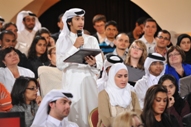
I want to ask something to the team against the motion. Kamel Wazne, he said that we are going to stop, we want to stop killing people, we want to stop killing people. Well, I think that Bashar al-Assad is the reason people are dying right now. Today 16 innocent citizens just died because of what? Because of the army that Bashar al-Assad leads.
TIM SEBASTIAN
Okay, Kamel Wazne?
KAMEL WAZNE
Look, as I said, there are a lot of players in this, what has taken place in Syria. I know I'm from Lebanon, I know what's going on in Lebanon, how the weapons have been smuggled from Tripoli into Homs. Those falling in the hands of some really bad people starting killing. I'm not saying there is no blood going on. One life is too many, but we have to look at the bigger picture. Yes, there is something bigger, bigger things is going in the Middle East and we should not allow it under the name of democracy.
TIM SEBASTIAN (to questioner)
Okay, all right. Do you buy that? Or do want to come back...?
AUDIENCE (M)
They just died for nothing. You said that you want a bigger picture. So these innocent people died for nothing, isn't that a big picture?
KAMEL WAZNE
No, no. I'm not saying for nothing. All I'm saying, I wanted reform, I wanted democracy, I wanted due process, but I want time. There are sanctions and continuing the sanctions and the blockade against Syria will not resolve the issue. It will bring more pain, more destruction, more chaos, it will not solve the problem. We have a problem...
TIM SEBASTIAN
Let the questioner come back, please.
AUDIENCE (M)
Look at Tunisia ...Ennahda are leading Tunisia and they didn't do anything bad.
KAMEL WAZNE
Come again, please?
AUDIENCE (M)
Ennahda are leading Tunisia and they are in better, in a way better way than they used to be.
TIM SEBASTIAN
Okay, all right, listen I'm going to take another question. There is a gentleman in the front row. Yes, you sir.
AUDIENCE (M)
I'm from Syria. I have actually a right question for both gentleman here and seeing as we all know that the old government based their structure on security agencies, why these secret agencies actually didn't do their job and not controlling the borders and didn't allow these weapons to get into Syria? Because for a very simple answer actually, because this is part of their plot. They want to get to this chaotic situation and this to be as a reason, as just to echo what's happened in Libya. When you're repeating this will be a sectarian war, there will be a chaotic situation, you are repeating the same echo from Saif al-Islam and his father, you are repeating the same thing from all other and previous dictatorships. This is part of the regime plot.
TIM SEBASTIAN
Okay, Ammar Waqqaf, do you want to reply to that?
AMMAR WAQQAF
I'm afraid I have to disagree a little bit. First of all, when for example when Secretary Clinton asks the insurgents not to drop down their weapons, just like my friend here mentioned, now does that tell you that America has something to do with supplying weapons to those regimes?
AUDIENCE (M)
I'm not asking about security, I'm asking about...
OBEIDA NAHAS
No, she didn't, she said people don't hand over yourselves.
AUDIENCE (M)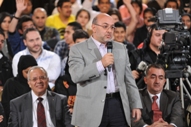
... why has security agencies, why the security, the Syrian security agencies that ruled our life and they took everything from our life, from freedom of speech, from any things, they controlled over, even our... they could have start counting our breaths, actually. Why didn't they do their job?
KAMEL WAZNE
Well, are you saying that if they smuggle weapons they can shoot at people? Is that what you're saying?
AUDIENCE (M)
No, I'm not saying this, I'm saying...
KAMEL WAZNE
You're saying if some people want somebody at the border....
AUDIENCE (M)
No, no, no, I'm saying...
KAMEL WAZNE
We have licence to kill? Is that what you're saying?
AUDIENCE (M)
No, no, I'm saying, I'm saying actually the government based their structure on security agencies.
KAMEL WAZNE
If you have like millions and billions dollars coming into Syria to buy people, to start like this civil war in Syria, is that the answer, what you want?
AMMAR WAQQAF
Is there a state in the world that can protect...?
TIM SEBASTIAN
All right, I think we're slightly repeating ourselves here. I'm going to take another question. I'm going to take a question from the gentleman up there, you sir, in the white shirt.
KAMEL WAZNE
They're all white shirts.
TIM SEBASTIAN
No, not all of them, only one there.
AUDIENCE (M)
Hello, my question is for...
TIM SEBASTIAN
You're from where?
AUDIENCE (M)
From the Philippines. My question is for Mr. Waqqaf and for the side against the motion. Throughout the entire debate, your side has pretty much tried to divert the responsibility for this situation in Libya away from Mr Bashar.
TIM SEBASTIAN
We're talking about Syria.
AUDIENCE (M)
No, Syria, Syria. Despite, despite him being the president of the republic, despite him being in charge of the government, you've pretty much diverted the attention, the responsibility away from him. If that is the case, then who is responsible for the situation and how can we put a stop to it? How can we bring justice to those people?
AMMAR WAQQAF
Can you please repeat the question?
AUDIENCE (M)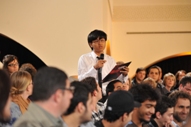
Who is responsible if not Bashar for the situation in Syria, who is responsible for the murders of those people? Who is responsible?
AMMAR WAQQAF
Okay, the situation first of all is about creating a sort of chaos in Syria and it's not about killing people. Now, obviously Syria has for a long time now, has not been the most cooperative state with regards to American interests and Western interests in the region. That's evident. Now, is that an opportunity for someone to come and destabilise the situation? I mean what happened in Tunisia and Egypt? Yes, it is. And somebody has, you know, invested heavily in this. The Guardian, the London based newspaper, the other day said President Assad is the most, you know, expensive person on earth because the level of money that was spent on toppling him is unimaginable. Now, anybody who doesn't really know...
TIM SEBASTIAN
So it's fact because it came from The Guardian?
AMMAR WAQQAF
No, but is it not fact because The Guardian said it? Of course. It is a notion that...
TIM SEBASTIAN
You believe everything suddenly you read in the newspapers?
AMMAR WAQQAF
Oh, I mean, I do, I do because, certainly, but I like that particular one.
TIM SEBASTIAN
You believe the things you want to believe, okay.
EMILE HOKAYEM
Don't you think Western nations spent more trying to topple Gaddafi and now they're actually bulking at intervention? The notion that this is driven from the outside is...
AMMAR WAQQAF
They spent more on Libyan lives than Syrian lives, that's what they spent, okay.
EMILE HOKAYEM
It's insulting to the Syrian people. They've been going out, they've been actually resisting violence; they actually are debating whether foreign interventions is the right thing or not, and you're actually blaming all this on the Western conspiracy? The West was actually at Bashar's door only a few months ago. The lines were open again; Hilary Clinton was talking about Bashar as a potential reformer, he should lead the transition. This is the reality of where the West stood ...
AMMAR WAQQAF
... the best for the Syrian people, why not for the Qatari people, why not for the Saudi people?
KAMEL WAZNE
What's really changed? The Americans were like hugging Bashar al-Assad for a very long time, what really changed?
EMILE HOKAYEM
The level of violence throughout the Arab world, the outrage in the Arab world.
KAMEL WAZNE
Is that what happened?
EMILE HOKAYEM
The 19 countries that approved the sanctions today are not lackeys of the West, they're all like us.
OBEIDA NAHAS
I can tell you why the Americans were happy with Bashar, because we were silent, we the Syrian people were silent and now we are paying the price for being silent for so long. But now we have spoken and they have to listen. Let me remind you of one thing. Just put...
TIM SEBASTIAN
Okay, briefly because I want to go on to the next question.
OBEIDA NAHAS
Put conspiracy theory on the side, Madeleine Albright visited Bashar and sat with him in private in 2000 during the funeral, and people think that that was a conspiracy theory, that Madeleine Albright said we support you to become president...
TIM SEBASTIAN
All right. Okay, I'm going to take...
OBEIDA NAHAS
Let's not talk about conspiracy theories.
TIM SEBASTIAN
I'm going to take some questions for this side of the debate (points to the side arguing for the motion). Does anybody have a question for this side of the debate? You sir, is your question for this side? It is. Would you like to have a microphone?
AUDIENCE (M)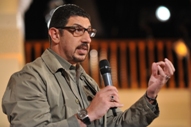
I'm from Cairo, Egypt. And my question is, if you really want to stop such a good argument, I think we need to go back to the main keyword in today's motion, which is resign. Resign, professionally speaking, is about that you were not able to deliver, that you were not able to do your job. So one of the job descriptions of Bashar al-Assad is that he is the commander of the military, the commander of the Syrian Arab troops. And those troops for the last nine months, they were not able to finalise a struggle with those aliens that there are coming and fighting them with a couple of rifles, smuggled via the Jordanian or the Turkish borders. What I'm trying to say is that if you use this argument, I think Bashar al-Assad was not able to fulfil his responsibilities and therefore he should resign. Thank you.
TIM SEBASTIAN
Which is basically your side of the argument (points to the side arguing for the motion), but for different reasons.
AMMAR WAQQAF
Was that a question for God's sake?
OBEIDA NAHAS
Bashar has not delivered anything for 11 years. I mean, opening one bank is not worth the lives of all these people. All he did, he reopened banks closed back 40 years ago; for God's sake what kind of development is that? He hasn't done anything as a president and all he did was go and conspire outside Syria, because basically he thinks there's a conspiracy coming towards him. So he has to go and conspire on everyone else and he always used the excuses of what's going in Lebanon, in Iraq...
TIM SEBASTIAN
Kamel Wazne.
KAMEL WAZNE
I just want to tell you. Wasn't Syria under a sanction from the United States since 1979, weren't sanctions tightened in 2003, weren't sanctions tightened in 2006? Wasn't Syria was under, because it supported the resistance in Lebanon? Was the devil in there in the Middle East?
TIM SEBASTIAN
What's your point?
KAMEL WAZNE
The point is, despite all of that, Syria succeeded in building some economic in the country; they built the country. Look at the GDP from when Bashar al-Assad came. He came from...
TIM SEBASTIAN
It's an economic success now?
KAMEL WAZNE
From 12 billion to close to 50 billion economy and he built a..
OBEIDA NAHAS
No, no, in his first...
KAMEL WAZNE
Look at the roads in Syria, look at the infrastructure.
OBEIDA NAHAS
No, no, in his first...
TIM SEBASTIAN
Okay, okay, you've made your point, you've made your point.
KAMEL WAZNE
What are you saying? What do you want? Somebody under a sanction?
TIM SEBASTIAN
Excuse me. Will you let somebody else speak?
KAMEL WAZNE
Yes, please.
TIM SEBASTIAN
How kind, thank you.
OBEIDA NAHAS
In his first, in his first three years in office, the growth rate was zero, do you know that?
KAMEL WAZNE
No, no, it was not the growth rate...
OBEIDA NAHAS
And there were no troubles then, we didn't have the Iraq war, he never delivered. He promised change from day one and he never did anything about it.
KAMEL WAZNE
That's not true.
OBEIDA NAHAS
Answer me one question.
KAMEL WAZNE
Look at [inaudible] now.
TIM SEBASTIAN
Okay, you've had a chance to speak. Please just let him.
KAMEL WAZNE
Well, he's saying something wrong.
TIM SEBASTIAN
Okay and then I will give you a chance to answer it.
OBEIDA NAHAS
Answer me one question. How do you think much more time he needs? How long do you think he'll be in office for?
KAMEL WAZNE
More what is given. What I'm saying...
TIM SEBASTIAN
What does that mean?
KAMEL WAZNE
That if really we're giving ten years, Israel destroyed Lebanon - before you clap - Israel destroyed Lebanon. Still Gaza under the blockade, the Arabs gave it since 2002.
OBEIDA NAHAS
So how many more years, how many more years?
TIM SEBASTIAN
Let him speak, let him speak.
KAMEL WAZNE
If the Arab League were very kind and they gave him one week, couldn't they give more? Is that what we're looking for? Are we looking...? We know where we're heading in the region?
TIM SEBASTIAN
Okay, all right.
OBEIDA NAHAS
No, I didn't know the role models for Bashar are the Israelis, by the way.
TIM SEBASTIAN
With your indulgence I'm going to move on to another question. There's a lady up there on the right, yes, you.
AUDIENCE (F)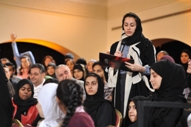
You who are opposing the motion keep saying that this revolution is not about Syrians. But these are Syrian people that are protesting, first of all. Second of all, in regard to the fact that you keep saying that it's not about the Syrians, it's a regional matter, what do you make of Netanyahu's recent statement that he disapproves of the Arab Spring?
TIM SEBASTIAN
Well, I think that the second question is a little off the mark. Let's take the first one, Ammar Waqqaf?
AMMAR WAQQAF
I totally agree. I totally agree, this is about Syrians. However, did anyone prevent any other stakeholder, regional or international, to jump onto the wagon? No. Yes, it was the Syrians who went onto the streets, that's for sure, and it was the Syrians who sacrificed their blood and the bloods, whether on the civilian side or on the military side or even on the armed groups side, yes. But other players and other stakeholders are benefiting from this big time, that's for sure. We cannot... Syria is not isolated, is it? Now with regards to Netanyahu's thing, was he meaning Syria or was he meaning Egypt?
TIM SEBASTIAN
Let's just take... the questioner wanted to respond to the first point.
AUDIENCE (F)
Well, what do you make of the videos of Bashar's forces torturing the protestors, making them kiss Bashar's picture and telling them there is no God but Bashar and there is no God but Maher. This is about the Syrian people.
AMMAR WAQQAF
Do you think anyone in Syria can get his hands...?
AUDIENCE (F)
Don't you think the Syrian people deserve better than that?
AMMAR WAQQAF
Do you think anyone in Syria or any person in Syria can get his hands on a pair of military outfit? Of course they can.
AUDIENCE (F)
That's absurd to even assume that.
AMMAR WAQQAF
Why do you think it's absurd? Why do think it was not staged?
AUDIENCE (F)
In a country that has the most powerful security apparatus I don't believe it's easy to just get...
AMMAR WAQQAF
How can you authenticise all the videos that are there as being true?
AUDIENCE (F)
Sorry?
OBEIDA NAHAS
And how can you do the same with the other videos?
TIM SEBASTIAN
How can you be sure that that video is true, that's the question he's asking you.
AMMAR WAQQAF
Yeah, and it's genuine. How do you think...?
AUDIENCE (F)
How can you be sure that video was not true? I see a man being abused and told to kiss Bashar al-Assad's picture.
OBEIDA NAHAS
The same applies to the ambush you were talking about in Banias. It happened. If we start down this line, then there's nothing true in Syria
AMMAR WAQQAF
Look, I went to Syria back in July.
TIM SEBASTIAN
Let him speak...you'll have a chance
OBEIDA NAHAS
We're ending up with 5,000 people losing their lives, including soldiers who were shot in the back for disobeying orders of killing civilians, these are our fallen heroes.
AMMAR WAQQAF
I went to Syria in July and I crossed Banias and on those bridges where the ambush took place, there are still, and I think until now, gun posts made by the army so that this thing that happened does not repeat again. Now saying that the army is not attacked is basically, you know, not believing all the funerals you see on television. These are official funerals by their comrades. They're taken, wrapped in the Syrian flag and they're taken to their mothers, sometimes with not a full body.
TIM SEBASTIAN (to questioner)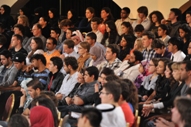
Okay, you're not happy. Do you want to stand up with the microphone so we can see you?
AUDIENCE (F)
I'm not happy at all. There are dead bodies, there are children with nail bombs in their bodies. Zainab Al-Hosni? How do you explain that? How do you explain nail bombs?
AMMAR WAQQAF
I thought Zainab Al-Hosni was alive.
AUDIENCE (F)
Are we going to say that the terrorist that...
AMMAR WAQQAF
Who's going to kill [overtalking].
TIM SEBASTIAN
Let her ask the question, please.
AUDIENCE (F)
Zainab Al-Hosni's parents do not know where their daughter is.
AMMAR WAQQAF
But she went on television, for God's sake.
AUDIENCE (F)
No, no.
OBEIDA NAHAS
What about the other body then?
AMMAR WAQQAF
Of course she did. She went on television, she showed her ID, she said I'm Zainab Al-Hosni, I left my parents' house and everybody...
AUDIENCE (F)
Okay, can you explain to me how my family's neighbours in Syria received a dead body with nails drilled into their body, with their nose cut off, with their ears cut off?
AMMAR WAQQAF
I have more than 50 relatives in Homs, madam.
AUDIENCE (F)
Sorry?
AMMAR WAQQAF
I have more than 50 relatives in Homs and they have been...
AUDIENCE (F)
So mine are lying?
AMMAR WAQQAF
... under threat from the armed groups from day one.
AUDIENCE (F)
Okay, my family has also been under threat from armed groups which were released by prisons by your regime.
AMMAR WAQQAF
Why do you think...? Why do you think...?
AUDIENCE (F)
To cause havoc, to show the people that without the regime there will be conflict, there will be sectarian war, there will be civil war. So these prisoners were freed, these prisoners were told to go and create havoc.
AMMAR WAQQAF
Sectarian chants were heard in Banias...
AUDIENCE (F)
My family were also threatened by those.
AMMAR WAQQAF
... from the first Friday.
AUDIENCE (F)
But I give it to you, these...
TIM SEBASTIAN
Don't please speak at once, please, please.
AUDIENCE (F)
I guarantee you, these armed groups are not the same people that returned my neighbour's dead body to their house.
TIM SEBASTIAN
Okay, let him reply to that
AMMAR WAQQAF
Sectarian chants were heard in Banias on March 18th, the first Friday of the so-called revolution. And it was not Bashar al-Assad's people who chanted them. Sectarian issues are there and they are still, I believe, by outsiders, and some people in Syria are falling for that.
TIM SEBASTIAN
Okay, you've made that point.
AUDIENCE (F)
It's a Syrian revolution and it's insulting to keep insisting that this is an outside revolution.
TIM SEBASTIAN
Okay, thank you very much.
AMMAR WAQQAF
There's a Syrian element, but it's not like that.
TIM SEBASTIAN
Thank you very much. Some questions for those who are supporting the motion, please. Yes, you have a question for these this side?
AUDIENCE (F)
Yes, I do. As we can see, there's support on both sides in whether he should resign or whether he should not resign. But I think something we need to understand is that either way there are people below Assad who are making these killings happen. I mean, so my question is, what will one man resigning make as a difference?
OBEIDA NAHAS
We don't want him to resign on his own. We want the whole regime to go with him. Let me tell you this. Bashar al-Assad's presence right now is a threat to the Syrian state. Because we believe in the institution, we believe in the army, which is a national institution, it's not his institution though he's trying to do it his own, and because we believe in other institutions, he has to go and take out the bad guys with him. They all have to go, including his brother, Maher and his brother-in-law, Assif, and his cousin, Atef Najib, and the rest. Everyone who has blood on their hands has to go with him. But because we're talking about his resignation tonight.
TIM SEBASTIAN
Ammar Waqqaf?
AMMAR WAQQAF
I think you actually asked a very good question and this is the point that very few people are willing to engage with. The regime is not a few people at all; it is about a way of thinking and how you change that. And if these five, ten, 20, 100 people resign, nothing will change because this is a culture of how people go about doing their business. So what is really needed to change is the system itself, not this phase or that phase. Thank you very much for that question.
EMILE HOKAYEM
And 11 years of Bashar al-Assad gives you hope that he is able to do that? He had 11 years to actually enact political reforms...
AMMAR WAQQAF
Do you think he would have done better, Emile...?
EMILE HOKAYEM
Pardon?
AMMAR WAQQAF
Do you think he would have done better, Emile?
EMILE HOKAYEM
I think they're very...
AMMAR WAQQAF
This guy was attacked from day one.
EMILE HOKAYEM
They are very capable people in the opposition who can lead the reconciliation inside the country, have a moderate discourse, can actually strengthen their hand to the Alawite community and others, are very concerned about what's happening right now. I don't see that Bashar al-Assad and his clique are able to lead, to get to that point where they're actually reconciling with most of the population.
AMMAR WAQQAF
You have to understand the way in Syria people perceive this matter. Some people actually in Syria think that the president is protecting them from these armed groups, I'm afraid, and they happen to be the majority. And I think they say that this president has done a very good job, look at what's happened in Libya, what 30 times the number of deaths?
TIM SEBASTIAN
Okay, I'm going to take a question from the lady in the yellow shirt up there. Yes, you, can you tell us where you're from please?
AUDIENCE (F)
Good evening. I have a question for the pro team.
TIM SEBASTIAN
You're from where, please?
AUDIENCE (F)
Lebanon. So if Syria becomes a democracy and President Assad resigns, who do you think will take the power, the Sunnis, the Shiites or the Alawites?
EMILE HOKAYEM
You mean in Lebanon itself or...?
AUDIENCE (F)
No, no, no, in Syria.
TIM SEBASTIAN
In Syria.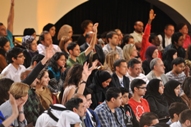
OBEIDA NAHAS
Well, in Syria we never had this language in politics before Assad came to power. In Syria everyone can reach the highest position in the country and it has always been like this.
TIM SEBASTIAN
Yes, but she's asking who you think is going to take over.
OBEIDA NAHAS
Whoever is elected by the people, we want a democracy.
TIM SEBASTIAN
Let him answer, please.
OBEIDA NAHAS
I can't determine the future president. It has to be determined by the people. We need a transitional government that will lead us into democracy, that will run elections and then we have an elected president. It's as simple as that.
TIM SEBASTIAN
Let me go back to questioner for a moment. Who would you like to see take over? If you support the motion that Assad must resign, who would you like to see take over?
AUDIENCE (F)
Honestly, I just think what makes, what is better for the citizens, what the citizens want. Because if another president comes and does the same thing, then it's going to be the same thing all over again.
EMILE HOKAYEM
One piece of advice from a fellow Lebanese, Syrians don't replicate the Lebanese system, work on a national identity, reconcile, don't divide jobs depending on sects. That's the way forward.
AUDIENCE (F)
Excuse me, I just have one more question. How will this affect the countries around Syria like if he doesn't resign?
OBEIDA NAHAS
If he doesn't or if he does resign?
AUDIENCE (F)
Oh, no, if he does resign.
OBEIDA NAHAS
If he does resign, believe me, it's going to be a peaceful region. I'm telling you, especially in Lebanon.
TIM SEBASTIAN
Kamel Wazne?
AUDIENCE (F)
No, no, I've heard that, this will have a big impact on Lebanon and just because the Syrians want him to leave it doesn't mean that other countries have to be inflicted in a war, let's say, if they didn't agree with what the citizens want. I just want to know if this has an impact, because here we're saying that this will have an impact on the countries like Lebanon, for example, and you're saying that would be extremely peaceful.
TIM SEBASTIAN
Okay, Kamel Wazne, do you want to have a quick word?
KAMEL WAZNE
Yes, I think that the future, if the situation go into this chaos, it's going to go into very bleak. We're looking at situation similar to Afghanistan in Syria. I think the situation, if it's sectarian war, will spill to Lebanon and to the region and nobody can stop it. And I don't think those people who are supplying weapons to Homs from Lebanon can expect another, you know, no reward for their action.
OBEIDA NAHAS
You sound like someone who has information on what's being planned if Bashar goes.
KAMEL WAZNE
Yes, I have seen it my friend.
OBEIDA NAHAS
By who? By who? Who's planning this?
KAMEL WAZNE
No, no, no, I have seen it in Afghanistan what happened to it and I've seen people in Iraq, how they get killed. I've seen how people destroy.
OBEIDA NAHAS
The only foreign intervention, by the way, the only foreign intervention...
KAMEL WAZNE
I've seen a lot of things happen...
OBEIDA NAHAS
... in Syria today is the Iranian intervention. Are you hinting at that?
KAMEL WAZNE
What?
OBEIDA NAHAS
Are you hinting at the Iranians trying to create some trouble in Syria? I just want an answer to that.
KAMEL WAZNE
No, it's not the Iranians trying to create trouble, but I think other Persian Gulf (countries) are afraid of the Iranian influence in the region and they are afraid of that road connection between Iran, Iraq, Syria, Lebanon, because they think this will destabilise the region. So they're looking at what cut it in the middle. The American was more...
TIM SEBASTIAN
So you're talking about the Persian Gulf fears?
KAMEL WAZNE
Yes, it is, and if you don't see it, I'm not saying it. This is the United States Congress; if you read it, they will spell it out to you if you can read it and they tell you exactly their worry, they lost Iraq. Look, my friend, what happened in Iraq, everybody supported...
OBEIDA NAHAS
Enough about Iraq please, let's talk about Syria.
KAMEL WAZNE
What happened in Iraq...
TIM SEBASTIAN
It's a little bit off the subject.
KAMEL WAZNE
No, it will replicate itself, will replicate itself in Syria and after eight years will happen the same thing.
EMILE HOKAYEM
The Gulf States, nine months ago the best Arab friend of Syria was Qatar.
KAMEL WAZNE
Yes.
EMILE HOKAYEM
And right now you're asserting there is a conspiracy coming from this place (Qatar). Why all these years of friendship, why these years of political and economic support?
KAMEL WAZNE
Qatar didn't know about democracy, there is no democracy in Syria for like all these ten years? Now they find out?
OBEIDA NAHAS
Gulf states don't have any personnel in Syria, it's only Iran that has personnel in Syria. Keep that in mind.
TIM SEBASTIAN
I'm going to take a question from the lady in the second row. Can you tell us where you're from, please?
AUDIENCE (F)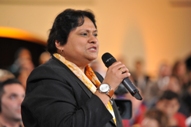
Good evening, everybody, I'm from India, living in Qatar now. First of all, I just have one question. We've been talking about President Assad resigning and he should go. My question is very simple: how many leaders are we going to just let go without accountability? Are you going to just let him just go? What about the factor of accountability and what is the guarantee that the next regime that's going to come in will be as accountable or as non-accountable as the one that's gone out? So my question is accountability.
TIM SEBASTIAN
Emile Hokayem, do you want to take that?
EMILE HOKAYEM
Well, I'm going to...
TIM SEBASTIAN
Don't be shy.
EMILE HOKAYEM
Well, we see one president in the Arab world right now, a former president, Hosni Mubarak, in front of, you know, in court, Saif al-Islam is next. But at the same time, Ali Abdullah Saleh of Yemen has been promised, you know, impunity. I mean he's leaving and he won't be judged. Ultimately what matters is what... it's to minimise the bloodbaths. And if the Syrian people or Syrian opposition can agree that Assad has to go and in exchange he will enjoy safe haven in another country, that's their decision to make.
TIM SEBASTIAN (to questioner)
You seem to be shaking your head.
AUDIENCE (F)
I don't quite agree with you because I think accountability is a major factor in countries all around the world. Political leaders get away with a lot of things because there is no accountability. There is no, you know, you don't have a person to blame. I think if you were sitting in a powerful position it's very important to be responsible and also to be accountable.
TIM SEBASTIAN
There's been quite a lot of accountability in the Middle East. I mean Gaddafi's dead, isn't he? You can't get much more accountable than that.
AUDIENCE (F)
So what happens after him?
OBEIDA NAHAS
I agree with you. I mean accountability is important and because we put off accountability for so long, we ended up in this situation.
AUDIENCE (F)
Yes, absolutely.
OBEIDA NAHAS
Now, but I'm assuring you, from now on any government who comes in, in Syria or any other Arab Spring country, it will be accountable and these revolutions are repeatable. They are not going to happen only once. Any government, even in Tunisia now, they have an elected government but they will be revolted against if they do the same.
TIM SEBASTIAN
Okay, all right. Thank you very much. Gentleman up there, you have a question?
AUDIENCE (M)
So my question is for the proposition team. First, I'm from Qatar so my question is, do you think resignation is the most suitable solution? Don't you think that if he could fulfil justice that it would contribute to the deterrence of the upcoming presidents?
TIM SEBASTIAN
What do you mean by fulfil justice?
AUDIENCE (M)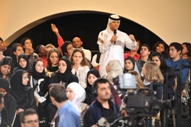
For Bashar al-Assad to be trialled and sentenced. Don't you think that it would contribute to the deterrence of the upcoming president not to do the same thing? That's my question.
TIM SEBASTIAN
Obeida?
OBEIDA NAHAS
Well, of course. I mean any future president has to be accountable as well as Bashar. Bashar and all the persons who are responsible for killing innocent civilians have to be accountable, of course. I mean we are not dying for him to go away and live a wealthy life, but of course for the time being we have to stop the killing, and we have proposed to the Arab League that we need observers to go in, we need to stop the killing. He has to go out of the country. This is going to be the first step, but definitely there should be some accountability. And I'm telling many people inside the regime...
KAMEL WAZNE
Stop killing on both sides.
OBEIDA NAHAS
Well, if this president goes, people who can't go with him will be accountable, so why...
TIM SEBASTIAN
Do you support, do you support accountability on both sides, the rebels as well?
OBEIDA NAHAS
I support accountability for anyone who's responsible for...
TIM SEBASTIAN
So the rebels as well?
OBEIDA NAHAS
Someone killing, anyone who kills.
TIM SEBASTIAN
If they're found to have committed human rights violations?
OBEIDA NAHAS
Anyone who kills civilians have to be accountable, that's the bottom line.
AMMAR WAQQAF
When is the Muslim Brotherhood going to be accountable for the crimes they committed?
OBEIDA NAHAS
Well, anyone who committed a crime against humanity, against civilians...
AMMAR WAQQAF
Would you be able to cooperate?
OBEIDA NAHAS
I'm not... I was a kid when that happened in 1982 so what are you trying to ask?
AMMAR WAQQAF
What I'm saying is that you cannot preach on accountability and get away with what you have done like 30 years ago.
OBEIDA NAHAS
No, no, anyone... I told you, anyone who's killed any civilians should be put on trial [overtalking].
TIM SEBASTIAN
Let's hear from the questioner.
OBEIDA NAHAS
Don't worry, it's everyone.
TIM SEBASTIAN
I want to hear from the questioner.
AUDIENCE (M)
Briefly, are you with Bashar Assad being sentenced and trialled after his resignation?
OBEIDA NAHAS
I'm in favour of that.
EMILE HOKAYEM
What's as important as accountability is also...
TIM SEBASTIAN
Sentenced if he's found guilty, let's not prejudge the trial.
OBEIDA NAHAS
I'm in favour of him standing trial, of course, and it has to be a just trial, although let's not forget that people on the ground who are feeling the pain every day, are calling for his execution. This is the situation.
TIM SEBASTIAN
Okay.
OBEIDA NAHAS
I think even here in Qatar, the other day people hang a doll of him.
TIM SEBASTIAN
Okay, Ammar Waqqaf?
AMMAR WAQQAF
I think we're getting ahead of ourselves a little bit. I've heard so much wishful thinking so far, but the fact of the matter is that...
OBEIDA NAHAS
Yes, we did the same.
AMMAR WAQQAF
If the president wants to resign, that has to come as a pressure from the Syrian people, and the Syrian people so far, the majority of them, as I explained from the very beginning, do not want him to go. Personally, I voted for him in 2007 and I still stand by my vote, and a lot of Syrians still do.
EMILE HOKAYEM
When he won with 97 percent of the vote, to which you feel was a fair election.
AMMAR WAQQAF
Well, at least mine was genuine, you see, Emile, and there are a lot of people who would say the same. You know, brushing aside people as if they were not there...
EMILE HOKAYEM
97 percent of Syrian voters wanted Bashar al-Assad in 2007.
AMMAR WAQQAF
People go in their millions to the squares and everybody, you know, treats them as if they weren't there.
TIM SEBASTIAN
Ammar Waqqaf, what would President Assad have to do to lose your vote?
AMMAR WAQQAF
A pretty grave thing. I elected...
TIM SEBASTIAN
Such as? Such as, for instance?
AMMAR WAQQAF
Well, in 2007 I elected him for a certain mandate which is to resist, to continue resisting the Israeli expansion and so on and so forth, to build the resistance axis. And I think as far as I'm concerned, he's done a very good job.
OBEIDA NAHAS
He never had the mandate for...
TIM SEBASTIAN
Okay, all right, lady in the front row.
AMMAR WAQQAF
Of course he had.
TIM SEBASTIAN
The lady in the front row, we'll get a microphone to you, if you'd stand up please.
AUDIENCE (F)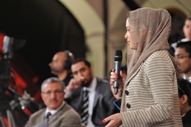
Hello, I'm from New York City. In the event of Assad's resignation, what will be done to prevent the rise of Islamic Fundamentalism in the event of a weak government?
TIM SEBASTIAN
Emile Hokayem, would you like to take that?
EMILE HOKAYEM
Well, one thing we've learned is that Islamist movements are best constrained when they're engaged, not when they're met with brutal force. You have to engage them and they are a defining feature of Syrian society. The Assad regime tried to crush them in 1982 and they're still around. It shows that they're a legitimate actor. They have to be engaged and they have also to understand the rules of the game, that there are minorities, there are others that are concerned about this. We have an example.In Tunisia - Ennadha. Ennadha elected more women than the Liberal forces in October during the elections. Everybody was so worried that this would be a Conservative retrograde group; well, it didn't happen. Islamist forces need to be tested; they have to be engaged and fought at the ballot box.
TIM SEBASTIAN (to questioner)
Okay, what do you think of that answer?
AUDIENCE (F)
I mean to simply engage and fight at the ballot box, I mean there's a matter of borders and topography and actual security. I don't think it's as simple as that. I mean, look at Yemen, for example. President Saleh has just resigned and you have these borders that are not being guarded. You have Saudi borders that you have these regimes and these organisations, these Islamic Fundamentalist organisations coming in. You can't just simply vote a democracy, you have borders and you have security issues.
EMILE HOKAYEM
But that's the issue of building a strong state, a state that controls its territory, a state that is accountable to its citizens. If the Islamists want to be part of the response, part of the effort at nation building, institution building, so be it. They have a role, they have a voice in society. But everyone has to... it's about building a state.
KAMEL WAZNE
But tell me what happened to the minority Christians in Iraq? What happened to them? There's the Islamists, they came into this area and what happened to them?
EMILE HOKAYEM
In Iraq you have...
KAMEL WAZNE
No, what happened to them?
EMILE HOKAYEM
In Iraq...
KAMEL WAZNE
They were, like now, refugees in the United States...
TIM SEBASTIAN
Okay, you asked him a question, let him answer it.
KAMEL WAZNE
I'm helping him.
TIM SEBASTIAN
Let him answer it.
EMILE HOKAYEM
In Iraq you had a very different set of conditions. The first one is that you had the foreign occupation that serves as a catalyst for sectarian fighting, whereas here in the case of Syria, what we do see is the opposition being multi-sectarian.
KAMEL WAZNE
And what about the.., how many people, how many Christian people were killed just a couple of days ago?
EMILE HOKAYEM
In...?
KAMEL WAZNE
In Syria. And the Christians are afraid in Syria, what happens to them, what happened in Iraq will happen to them...
OBEIDA NAHAS
....I mentioned in my introduction is a Christian, did you know that, who was killed by the ..
TIM SEBASTIAN
If you all talk at once nobody can hear anything.
KAMEL WAZNE
... terrified about the change in Syria.
EMILE HOKAYEM
Who is terrified about the change in Syria?
KAMEL WAZNE
Aren't the minority terrified about the change?
EMILE HOKAYEM
Minorities, it's a scarecrow. Of course change is always scary but the point is...
TIM SEBASTIAN
I'm going to go back to the questioner please. Excuse me, I'm going back to the questioner, please.
AUDIENCE (F)
I have no doubt that there is a religious, there are religious minorities that are under siege and under oppression all over the world; you can talk about the Coptics in Egypt and the Christians in Syria.
TIM SEBASTIAN
But your worry is the rise of Islamic Fundamentalism?
AUDIENCE (F)
But my worry is the rise of Islamic Fundamentalism. You spoke about elections and voting and then you said, well, yes, the Islamists can come and have their voice. Well, how much of a voice do we really want them to have?
EMILE HOKAYEM
We have two strategies out there. We have the regime strategy that is basically to inflame sectarian passions, to stay in power, and you have another one which is to engage the Islamists. Between the two, my choice is made. I think most of the Syrian people prefer to engage the Islamists instead of actually being engaged in a nasty war, a sectarian war that the regime is actually instigating as we speak.
AMMAR WAQQAF
That is no ... the Syrian's preference
OBEIDA NAHAS
No, if you have fears, and many people do have fears, I have fears myself, but if we have fears, should we deny the people the choice? I mean, let's go back in history and think about what happened back in the 50s. The Islamists were running for elections supported by Christians. Faris al-Khoury, who was the first Christian prime minister in Syria, was supported by the Muslim Brotherhood back then. It's never been about religion in Syria, it's been about politics.
TIM SEBASTIAN
Okay, all right. I'm going to take a question from the lady up there, yes you. Wait for a microphone and then tell us where you're from please.
QUESTION (F)
Hi, yes, my question is...
TIM SEBASTIAN
And you're from?
QUESTION (F)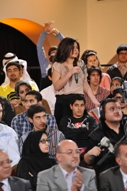
I'm from Lebanon. And my question's for the people that are for the motion. You mentioned that you want a whole different regime, a new president, a new people under him, a new regime. In past events, in all round history, there's been records showing that people are unaware when they vote for a new regime. How can you make sure that the new regime or the new president won't turn out like Bashar al-Assad or won't turn out like another dictator? How can you make sure that this time will be different? Because it may not be.
TIM SEBASTIAN
Okay.
OBEIDA NAHAS
Well, this is, I mean all these, you know, fantasy questions, I mean these are about the future. How did the people of the United States know that George Bush was going to go into two wars? How did they know? Nobody can know. We can't know the future, madam. But what we can do is we can work on it and we can try to secure a good future. That's all we can do.
QUESTION (F)
So what if it turns out...?
TIM SEBASTIAN (to questioner)
There are no guarantees in life I think they're telling you. There are no guarantees. Would you rather stick with Bashar al-Assad?
QUESTION (F)
Oh, no.
TIM SEBASTIAN
Okay, ladies and gentlemen, we're running out of time. Before we come to the vote, I'm going to ask each of the speakers to crystallise their arguments in one sentence and we're going to go round the table, and then we're going to vote. So Obeida, if you'd like to start, just one sentence please.
OBEIDA NAHAS
I think the Syrian people deserve better than a bunch of guys who'll kill us because there are massacres everywhere else.
TIM SEBASTIAN
Emile Hokayem.
EMILE HOKAYEM
Bashar al-Assad has underperformed for 11 years. Why give him the benefit of the doubt?
TIM SEBASTIAN
Kamel Wazne. One sentence.
KAMEL WAZNE
I think we need healing, we need reconciling and we need more patience and the time is to give it, or we have to pay a heavy price in the future.
TIM SEBASTIAN
Okay, Ammar Waqqaf.
AMMAR WAQQAF
When the majority of Syrians really want Bashar al-Assad to go, we'll let you know about it.
Vote result
TIM SEBASTIAN 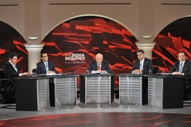
Okay, we have reached the point in the proceedings, we're going to vote on the motion that This House believes President Assad must resign. Let me just explain to you how the voting machines work, if you haven't used them before. If you want to vote for the motion, that's the side represented by those on my right, you will press in a moment button one. If you want to vote against the motion, that is the side represented by those on my left, it's button two. Whichever button you want to press, would you please do it now. You only have to press once. In just over 15 seconds' time your vote will be communicated to the computers and we'll have it on the screen for you. There is the vote. There is the vote: 91% for the motion, 91% for the motion, 9% against. The motion has been resoundingly carried, one of the largest majorities I think we've ever had in our 58 long series of the Doha Debates. So all I have to do is to thank our distinguished speakers, thank you very much for coming. Thank you to you, the audience for your questions. The Doha Debates will be back again in a month's time. Till then from all of us on the team, have a safe journey home. Thanks for coming. Goodnight, thank you.
Watch online

